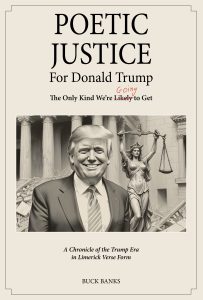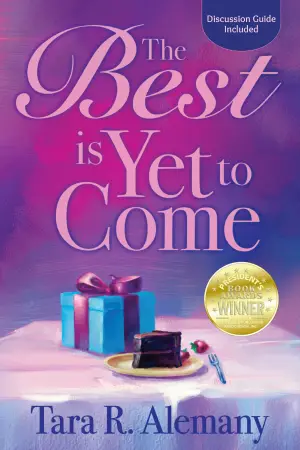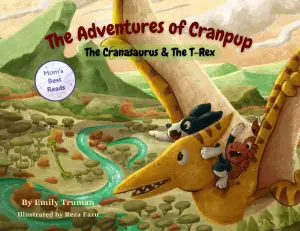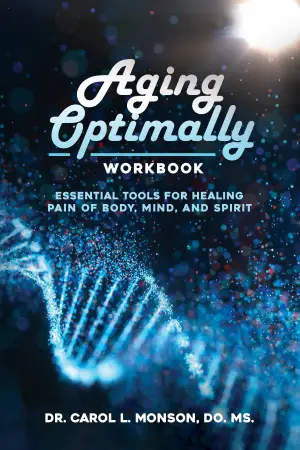
Today, we have the pleasure of interviewing author Buck Banks. With a background in public relations, editing, reporting, and freelance writing, Buck has a wealth of experience in the world of literature and journalism. A native and proud resident of Florida, Buck has managed to steer clear of any wild antics that could have landed him the infamous “Florida Man” title. Let’s dive into the mind of this talented writer and discover the inspiration behind his work.
When did you start writing?
I started writing and keeping notebooks in my late teens and got more serious about it during college. As a young adult, I published a “literary journal” pompously entitled “The Guild Literati,” if, by “publishing” you mean making black-and-white photocopies and stapling them together. The content included poems and writings and artwork done by me and my friends.
What is your favorite childhood book?
“The Ant Men” by Eric North. I read the book, which is about some scientist/explorers who encounter a race of giant ants in the desert in Australia, when I was in sixth grade. It opened my eyes to the wonders of fiction and inspired me to become a library assistant at Orangewood Elementary in Fort Myers, Florida, and launched my lifelong love of books and literature.
Did you ever consider writing under a pseudonym?
I do write under a pseudonym. My given name is Roland Wellington Banks III, which sounds pretentious. “Buck Banks” is how I have been known in my adult and business life. As I always say to people who comment on my nickname: “Easy to remember, hard to forget.”
If you had to do something differently as a child or teenager to become a better writer as an adult, what would you do?
Write more and show my work to others. Oh, and learn how to type.
What drew you to writing your preferred genre?
I developed a love of the limerick verse form while playing rugby in college. It’s a tradition to have a party after each rugby match where the team competition typically devolves into filthy songs and poems. Despite ingesting copious amounts of beer, I was able to memorize many songs and poems — mainly filthy limericks — which made me a very valuable team member. We were not very good, so we didn’t win many matches, but we never lost a party.
What is the most difficult part of your artistic process?
Since my subject matter is politics and life in the Donald Trump era, my greatest challenge is narrowing my focus to a single egregious act of cruelty or idiocy and then highlighting it with a limerick. There are so many instances of mean and stupid things Trumpers do these days that it can be difficult to choose.
What is the first step to your writing process?
Finding a topic or incident or person that incites me to literary violence.
Does a big ego help or hurt writers?
One has to have something of an ego to believe that what you have to say is interesting or important to other people.
How many books have you written?
Two. My first volume of satirical political limericks was “Poetic Justice Volume I: The 2012 Presidential Campaign in Verse,” which was published in 2015. It covered the campaign between Barack Obama and Mitt Romney. My second book, “Poetic Justice for Donald Trump: The Only Kind We’re Going to Get” was published this year and covers the first Trump administration and beyond. I also maintain a Substack where I publish ripped-from-the-headlines limericks illustrated using an artificial intelligence generative technology. I’m planning to turn that effort into a book of illustrated limericks.
Are there any projects or books you working on now?
I maintain a Substack where I am publishing new limericks several times a week, illustrated using artificial intelligence generative technology to create appropriate or inappropriate images that capture the essence of the poems. I plan to turn that effort into a book of illustrated limericks.
What inspired you to write this book?
My hatred of Donald Trump and everything he and his enablers are doing to ruin our democracy. I was frustrated by what I was witnessing as the dismantling of the United States of America and was searching for a way to be part of the resistance. I see this book as my small effort in supporting that movement.
What are the most important magazines for writers to subscribe to?
The New Yorker, for the quality of the writing. And, of course, this august publication.
What are the words you live by?
In the Trump Era, writing satirical political limericks is a form of resistance.
What is your favorite quote from your book?
It is my fervent hope that these verses cause the reader to recall the shock, anger and indignation we felt almost daily during the Trump years — sentiments that have apparently dulled with the passage of time — and to recall the very real threat to democracy the 45th president of the United States represented then and still represents today
You can find out more about Buck Banks here>>
A Book by Buck Banks
Want to read some of Buck Banks’s work? Keep reading to learn about Poetic Justice for Donald Trump: The Only Kind We’re Going to Get.
 POETIC JUSTICE FOR DONALD TRUMP: The Only Kind We’re Going to Get is a compilation of satirical political and topical limericks ripped from the headlines during the Donald J. Trump era and collected here for the first time. They follow Trump’s political career from his descent down the escalator at Trump Tower in 2015 through two impeachments, his defeat by Joe Biden in the 2020 presidential election, past the January 6, 2021, insurrection at the Capitol, and ending at his conviction on 34 felony counts in a Manhattan court in 2024. They range from humorous to thought-provoking to enraging.
POETIC JUSTICE FOR DONALD TRUMP: The Only Kind We’re Going to Get is a compilation of satirical political and topical limericks ripped from the headlines during the Donald J. Trump era and collected here for the first time. They follow Trump’s political career from his descent down the escalator at Trump Tower in 2015 through two impeachments, his defeat by Joe Biden in the 2020 presidential election, past the January 6, 2021, insurrection at the Capitol, and ending at his conviction on 34 felony counts in a Manhattan court in 2024. They range from humorous to thought-provoking to enraging.
Purchase Poetic Justice for Donald Trump: The Only Kind We’re Going to Get here>>







